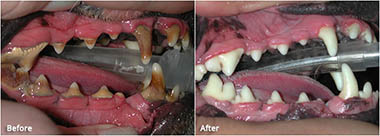Vero Beach Pet Dental Care

Pets have dental diseases and problems just like humans do. Regular dental check-ups at Divine Animal Hospital, combined with good dental hygiene at home, can increase your pet's health, vitality and well-being, ensuring your pet leads the best life possible.
If left untreated, dental disease can not only be painful and inhibit proper nutrition, but can also lead to serious systemic issues that may threaten your pet's overall health before symptoms are noticeable.
Your pet's dental appointment includes:
- Oral examinations under anesthesia
- Diagnosis and treatment of periodontal disease
- X-rays
- Supra and subgingival scaling
- Tooth extractions
- Polishing
- Irrigation
- Fluoride application
Should your veterinarian find any issues—such as evidence of gum or tooth erosion, gingivitis or excessive plaque buildup—we will discuss the diagnosis and offer treatment options for your pet. We are experienced dental practitioners and are capable of offering a number of dental procedures and oral surgeries.
Pre-Surgical Bloodwork
Before your veterinarian performs any dental procedure, they gather pre-surgical blood samples. Using our state-of-the-art laboratory, bloodwork allows for us to establish a baseline of your pet’s normal levels. This is important for any surgical procedure, because it allows for your veterinarian and the technical staff to notice any discrepencies or changes in blood levels during and after surgery.
The closer your pet’s blood is monitored—from before the dental procedure all the way to post-operative care—the greater chance your veterinarian will have to diagnose and treat any issues that might arise.
In Between Cleanings: Dental Care at Home
You can prevent serious dental problems by making sure your pet receives dental exams at the time of each vaccination, again at 6 months of age, and then annually. In between veterinary visits, check your pet's teeth regularly for signs of problems. Brushing your pet's teeth is the single most important procedure you can do to maintain good oral health. If performed regularly, brushing dramatically decreases the incidence of gingivitis and can increase the interval between teeth cleaning appointments.
Symptoms of dental disease include:
- Bad breath - one of the first signs of dental disease
- A yellowish-brown crust of plaque on the teeth near the gum line
- Red and swollen gums
- Pain or bleeding when your pet eats or when the mouth or gums are touched
- Decreased appetite or difficulty eating
- Loose or missing teeth